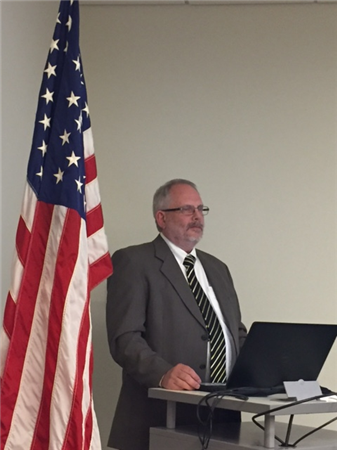Concordia University professor Tobin Beck told Seward Rotarians on Wednesday that as we remember those whose lives were taken in the terror attacks of Sept. 11, 2001, we also should consider those who are risking their lives now to try to promote peace and understanding among people of the world.
Concordia University professor Tobin Beck told Seward Rotarians on Wednesday that as we remember those whose lives were taken in the terror attacks of Sept. 11, 2001, we also should consider those who are risking their lives now to try to promote peace and understanding among people of the world.
Beck, 66, who is assistant professor of journalism and political science at Concordia, spoke at the weekly Seward Rotary Club luncheon at the Jones Bank auditorium. Fellowship and a brief business meeting preceded the weekly program. Dr. Daryl Hackbart was the Seward Rotarian of the Month and program chair and introduced Beck. Beck grew up in Seward and was a professional journalist for 31 years, including 27 with the global news service United Press International, before returning to Seward with his wife, Ellen, and son, Jonathan, in 2008 to teach at Concordia.
The Rotary meeting opened with a recitation of the Rotary “Four-Way Test,” and at the start of his presentation Beck said the test’s value questions – “Is it True? Is it Fair? Will it bring Goodwill? Will it benefit all Mankind?” are very close to the codes of ethics that professional journalists follow.
Beck began by showing a photo of Ghulam Mujaddidi, a friend and former Fulbright scholar at the University of Nebraska-Lincoln. Beck and Mujaddidi both were students in the master’s program in political science, and helped each other study for comprehensive exams. The photo showed Mujaddidi standing in line to vote last October in his hometown of Kabul, Afghanistan. Beck said the photo is significant because Mujaddidi, a Muslim who is fluent in five languages, is committed to working for peace for his country and to oppose radical groups, such as the Taliban, who use terror tactics.
Beck also pointed out that the Taliban have been in the news recently because of negotiations with the U.S. regarding the Taliban’s future in Afghanistan. President Trump last week broke off negotiations after the Taliban claimed credit for a bombing that killed an American soldier. Beck said it is important to remember Afghanistan when thinking about 9-11, because the mastermind of the terror attacks was Osama bin Laden, who was in Afghanistan at the time. He reminded the group that when the Taliban were in control of Afghanistan in 2001, they shielded bin Laden, which is how the U.S. war in Afghanistan got started. The U.S. military presence in Afghanistan continues now, 18 years later. Beck said that according to Mujaddidi, most Afghans want Americans to remain in Afghanistan, because their presence contributes to stability and peace.
On the morning of Sept. 11, 2001, Beck was executive editor of UPI, in charge of day-to-day operations of the news service as deputy to the editor in chief. The UPI news bureau was one block northeast of the White House. Beck presented a detailed PowerPoint timeline of 9-11 events, and told how the UPI news team and other journalists scrambled to respond to events that began with two planes hitting the World Trade Center twin towers 18 minutes apart.
Beck said that he worked with a very competent, dedicated and responsible UPI news crew of reporters and editors as they scrambled to keep up with events, fact-check rumors, and file accurate and timely reports. He also said he experienced the sensation of “time slowing down” as he worked to coordinate and edit stories, the feeling that things were moving in slow motion, with tasks becoming crystal clear because of the intense focus required to keep up with the four hijackings and crashes that occurred at the World Trade Center in New York, at the Pentagon just outside Washington, and in a field in Pennsylvania.
Ten days after the 9-11 attacks, Beck went to New York and reported from Ground Zero. He shared with Rotarians some of the photos that he took there, and talked about the sense of grief but also the sense of people reaching out to each other. There was a strong sense of wanting justice for those who had carried out the attacks, but also a strong sense of people wanting to help each other. Many of the people that Beck interviewed talked about anger and loss, but also about how they were reflecting on ways that they could do something good to help others, as a way of fighting back against the tragedy.
Beck asked the Rotarians to remember the legacy of those who lost their lives in the Sept. 11 attacks, and also to think about the journalists around the globe who work under sometimes very dangerous circumstances to inform us about what’s happening in the world. Beck in particular mentioned his friend and former UPI colleague Anwar Iqbal, a Pakistani journalist who interviewed Osama bin Laden in the 1990s and who in the past has faced death threats but continues to report, writing from Washington. Beck distributed copies of two journalist ethics codes – that of the Society of Professional Journalists and that of the Radio-Television-Digital News Directors Association, which stress that journalism is a public trust, and that journalists should seek truth and report it. Beck also distributed copies of a news column that he wrote last year on the topic of “Real vs. Fake News: Some Guidelines on Telling the Difference.”
